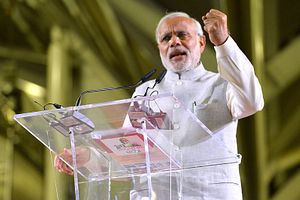India has announced that it is pulling out of the Regional Comprehensive Economic Partnership (RCEP) negotiations. Prime Minister Narendra Modi expressed his clear discontent earlier this month at a summit in Bangkok, claiming that the negotiations did not reflect the RCEP guiding principles. More specifically, Vijay Thakur Singh, secretary (East) of India’s Ministry of External Affairs, pointed to flaws in safeguards.
RCEP negotiations have been postponed a number of times before, despite repeated declarations that a settlement would be reached within the year. One significant obstacle has been India’s firm resistance to the liberalization of trade in goods. RCEP negotiations without India may now be concluded next year, but a deal without India would have significant implications for the future regional order.
RCEP negotiations were expected to work as a framework for a free and open economic system alongside the Comprehensive and Progressive Agreement for Trans-Pacific Partnership (the so-called TPP11), which has already been agreed. Following the US withdrawal from TPP negotiations in 2017, many eyes turned to RCEP. Both China and India, which represent emerging economies supporting a free and open economic system, were expected to be effective in countering the Trump Administration’s America First policy and the protectionist trends that also have gathered momentum in other parts of the world.
To India, which has a $105 billion trade deficit with the other countries participating in RCEP negotiations, including a $54 billion trade deficit with China, it appeared that a RCEP that further promoted free trade with these countries would represent a blow to its economy. A deal could have impeded India’s efforts to promote its manufacturing industry, a key plank in Modi’s policy agenda. Now that New Delhi has pulled out negotiations, which have been ongoing since 2013, on the grounds of national interest, it can be argued that it has hoisted the banner of India First. Moreover, an emerging economy like India rejecting RCEP could influence the position other countries take on the negotiations. More broadly, it could derail efforts to maintain a free and open economic system.
In addition, the decision could mean that Asian regionalism, a trend hitherto driven mainly by the elite, is changing, at least in the economic sphere. Historically, the general public in Asia has shown little interest in agreements on regional cooperation and integration. But some countries saw opposition emerge during TPP negotiations, suggesting that the situation could be changing. Farmers and dairy farmers staged fierce protests across India during the RCEP Summit in Bangkok. Criticism RCEP grew among the general public, and the Indian National Congress, the largest opposition party, condemned the talks. Modi cannot afford to ignore this domestic criticism. Some had predicted that the Modi administration would display more enthusiasm about the RCEP negotiations after this year’s general elections. Ultimately, though, the government felt it could not ignore the widespread domestic opposition. Modi cannot ignore the will of the people and expect to hold onto power in a pluralistic and unstable democratic system.
This in turn represents a major new obstacle to initiatives like RCEP designed to boost cooperation among Asian countries. No longer can talks move forward only based on the calculations of the internationalist economic elite, who consider agreements necessary to connect domestic economies with the global economy.
In geopolitical terms, India’s withdrawal was a blow to Japan. For Japan, RCEP is an important step towards a free and open economic system, one that would pressure the United States to return to a trade framework, with an Indian presence checking Chinese influence. While Tokyo desperately sought to keep New Delhi from withdrawing, Beijing has been more than open to continuing negotiations among the 15 countries. To Japan, which is pursuing the Free and Open Indo-Pacific (FOIP) Strategy, India’s withdrawal from RCEP has revealed that India is not going to be an easy partner to work with. With Chinese influence growing in recent years, identifying ways to secure a stable international and economic order that works to the benefit of the entire region is becoming an increasingly difficult challenge for all countries, including Japan.
Mie Oba is a professor at the Tokyo University of Science.
































